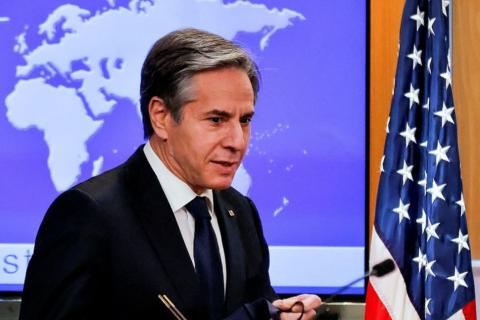Will Joe Biden End the Brutal War in Yemen?


It didn’t break through the crush of media coverage surrounding the probably-over-but-still-unsettled US presidential election, but United Nations Under-Secretary-General for Humanitarian Affairs and Emergency Relief Mark Lowcock tweeted a dire warning a few days ago about arguably the world’s worst ongoing humanitarian crisis:
Lowcock’s tweet included a link to his November 11 UN Security Council testimony on the situation in Yemen. He and World Food Program executive director David Beasley outlined the effects that over five years of war and blockade, the result of a 2015 intervention by Saudi Arabia and the United Arab Emirates (UAE) into what had been a purely internal civil conflict, have had on a country that is unable to feed itself even in the best of times. Now, the cumulative impact of so much deprivation and violence is being exacerbated by the growing indifference of the international community. As Lowcock said in his testimony:
With seven weeks left in the year, our response plan has received $1.5 billion, that is about 45 per cent of requirements. Last year at this time, we had received twice as much — almost $3 billion. […] Beyond that, 9 million Yemenis could lose access to basic health services, and treatment of more than half a million malnourished children could stop.
Over recent months, the UN has criticized Saudi Arabia and the UAE, the two countries most responsible for Yemen’s starvation crisis, for either failing to fulfill their pledges, in the case of the Saudis, or for refusing to pledge any money in the first place, in the case of the Emiratis.
They are not entirely responsible for this emergency — the Houthi rebels controlling most of northern Yemen have obstructed humanitarian aid deliveries and refused to put transparency mechanisms in place to ensure that aid reaches those in need and is not diverted to the black market.
But much of that blame, ultimately, must fall on the United States, which indulged the Saudis in their initial Yemeni intervention and has refused to reconsider its support for their war effort despite the tremendously brutal toll it’s taken on the Yemeni people.
Whether he agreed with the war’s aims or viewed helping them in Yemen as an easy way to assuage Saudis who were nervous about his diplomatic outreach to Iran, former president Barack Obama lent crucial assistance to the Saudi military effort from the start, particularly in terms of refueling and maintaining Saudi aircraft. That assistance has only escalated under the Trump administration which, far from appeasing the Saudis, largely agrees with them about the need to brutalize Yemen in order to deal a blow against Iran, given its relationship with the Houthis.
Donald Trump’s personal and professional enthrallment to the Saudi monarchy has also motivated him to indulge Saudi Arabia’s cruel excesses to an even greater degree than past US presidents. US support has been and still is critical to maintaining the Saudi campaign; ending that support would almost certainly force the Saudis to pare back drastically and put more effort into finding a diplomatic way out of the war.
On the campaign trail, candidate Biden took an unambiguous, even shocking, position on the US-Saudi relationship, threatening to cut off US weapon sales to the Saudis — and in one Democratic primary debate promising to “make them … the pariah that they are.” The Biden campaign on more than one occasion claimed that the candidate was opposed to continued US involvement in Yemen.
In general, the tenor of discourse around the Yemen war within the Democratic Party has shifted, with several former Obama administration officials now arguing — albeit too little and too late — that the United States should exit the conflict. Even Congress has made its bipartisan opposition to the war clear, passing a War Powers resolution last year that would have ended US involvement in Yemen had Trump not vetoed it.
We know that Joe Biden says he opposes the war in Yemen and that he will soon, barring some unforeseen development, soon have the power to end it. Will he?
Campaign rhetoric notwithstanding, there is nothing in Biden’s lengthy record of public service, as a leading Democratic voice on foreign policy in the US Senate and later as vice president, to suggest he will make a fundamental change in the US-Saudi relationship. Certainly the Saudis don’t appear to believe he will.
But ending US involvement in Yemen is a less momentous step. If Congress takes up and passes another War Powers resolution, ending this war that’s immiserated millions of Yemenis could require nothing more than Biden’s signature. If it doesn’t, Biden can essentially end US involvement by executive action.

Yemeni officials on Monday condemned arrests and prosecutions by the Iran-backed Houthi militia directed against media, journalists and celebrities…

Yemen's warring parties are gearing up for new waves of conflict in 2023 amid a lack of decisive steps towards sustainable peace, adding to the suf…

The UAE will help to recruit doctors and deliver crucial supplies for hospitals in Yemen under a major healthcare drive. The Khalifa bin…